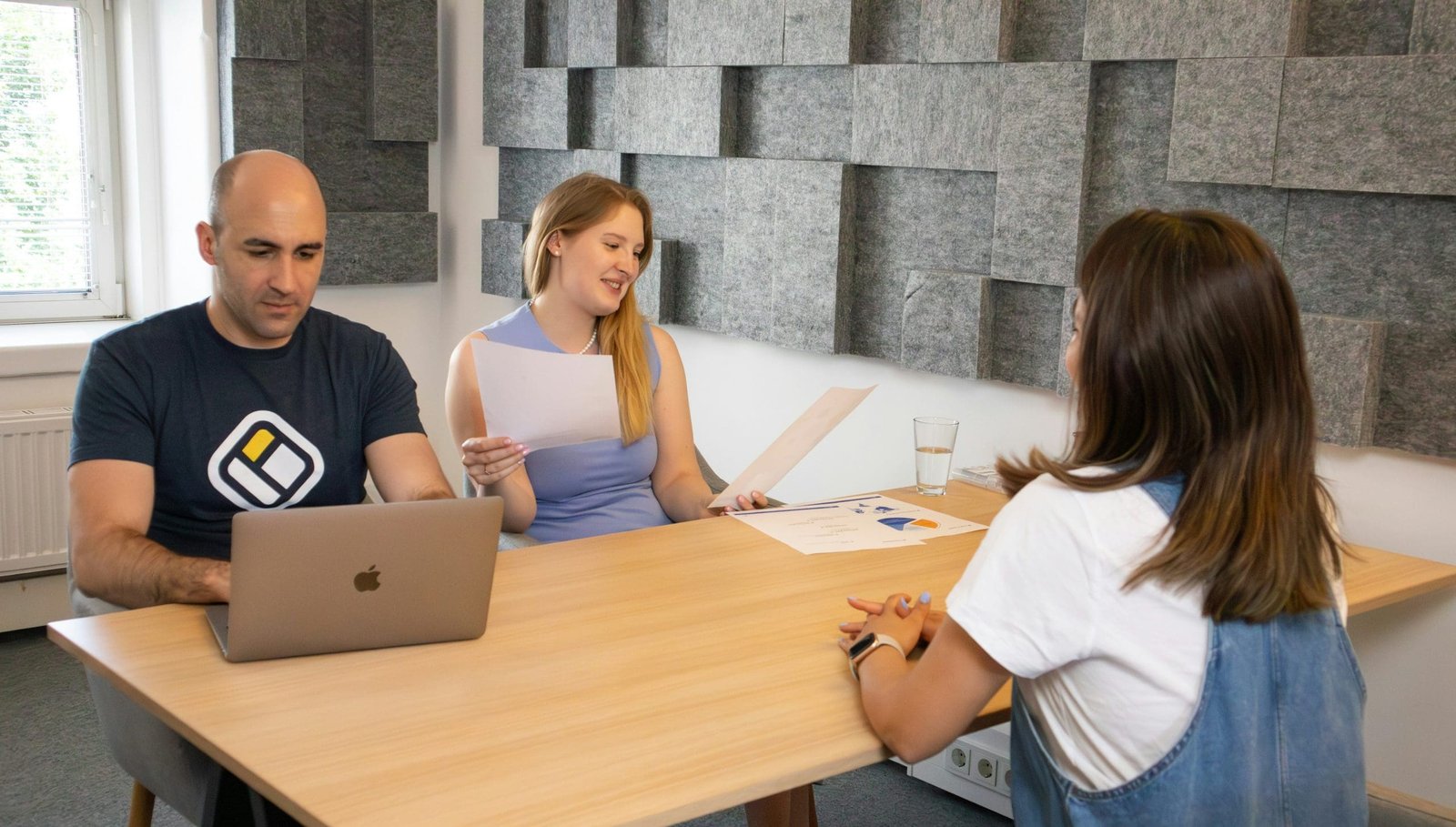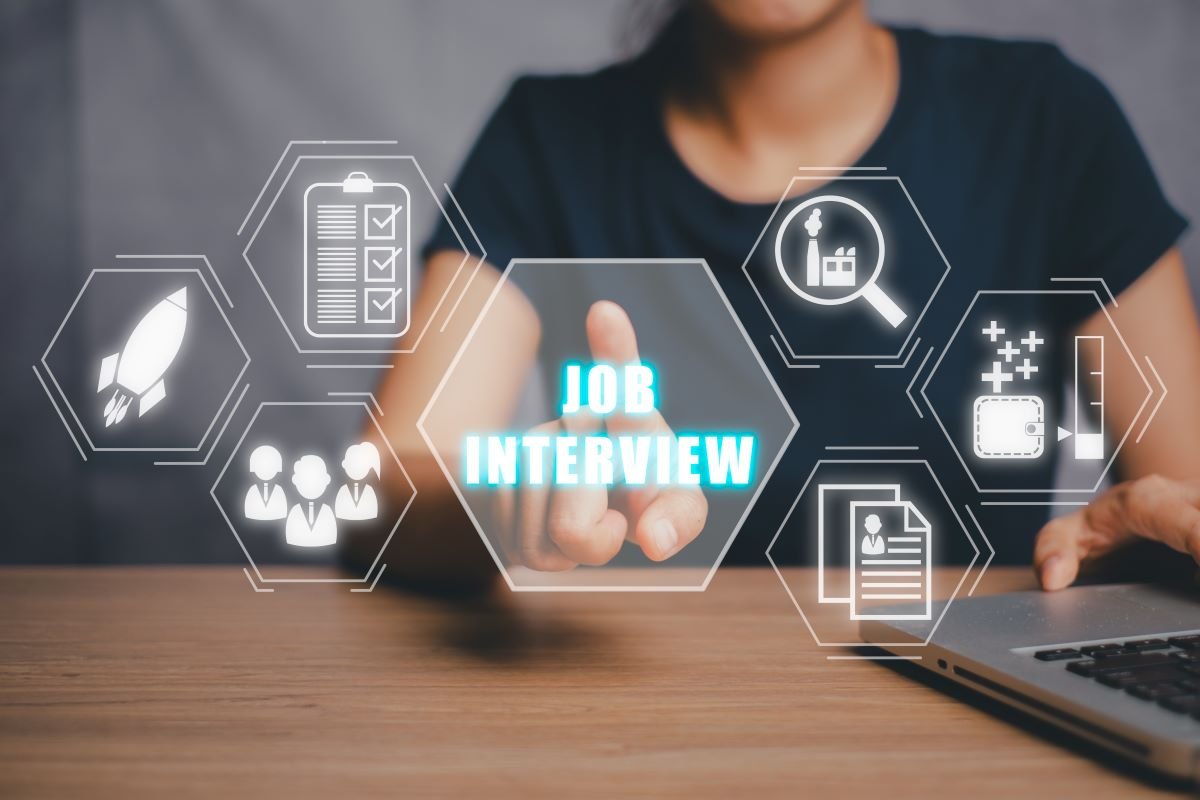We can’t read minds (unfortunately!), but we can give you the next best thing—a list of 64 of the most common interview questions, along with expert advice on crafting your own answers.
While we don’t recommend memorizing scripted responses (seriously, don’t do that), we do suggest getting comfortable with what you might be asked, what hiring managers really want to hear, and how to prove you’re the right fit.
Think of this as your ultimate interview prep guide. (And don’t miss the bonus section at the end, with resources on everything from emotional intelligence questions to role-specific ones—like for teachers, accountants, or project managers.)
6 Most Common Job Interview Questions & Answers
1. “Tell me about yourself” / “Walk me through your experience”
This seems simple, but a lot of people don’t prepare for it—and that’s a mistake. Here’s the key: Don’t recite your whole resume. Instead, give a short, compelling pitch that shows why you’re perfect for the job.
Pro Tip: Use the “Present, Past, Future” formula:
- Present: Briefly describe your current role (including a key achievement).
- Past: Explain how you got there (highlight relevant experience).
- Future: Connect it to why you want this job.
Example Answer:
“Right now, I’m an account executive at Smith, managing our top client. Before that, I worked at an agency handling three major healthcare brands. While I loved the work, I’m really excited about digging deeper with one healthcare company—which is why this role at Metro Health Center appeals to me.”
2. “Walk me through your resume”
Similar to “Tell me about yourself,” but here, you’ll group your experience by past roles—almost like telling your career story. You can go chronologically or start with your current job and explain how it led you here.
Example Answer:
“My career path has been a bit winding! In college, I double-majored in chemistry and communications. I realized lab work wasn’t for me, but I loved teaching as a TA. After graduation, I went into sales for a healthcare company, then moved into sales training. My trainees consistently outperformed others, and I realized how much I enjoyed coaching—which led me to get my teaching certification. Now, I’m eager to start my first full-time teaching role, and your school’s small class sizes really stand out to me.”
3. “How did you hear about this position?”
This isn’t just small talk—it’s a chance to show enthusiasm for the company. If a connection referred you, name-drop them! If you found it online, mention what caught your eye.
Example Answer:
“A friend of a friend, Akiko, mentioned the opening. I’ve been following your company for a while, so I jumped at the chance to apply!”
📌 Read More: 3 Ways to Nail “How Did You Find This Job?”
4. “Why do you want to work here?”
Avoid generic answers! Show you’ve done your homework by pointing to something unique about the company—whether it’s their culture, growth, or mission.
Example Answer:
“I read on The Muse that you’re expanding to the West Coast—and I’m excited about the chance to help train new teams. Plus, I saw your Mexico expansion plans in the Wall Street Journal. Since I’m fluent in Spanish, I’d love to help bridge communication there.”
📌 Read More: 4 Ways to Answer “Why This Company?”
5. “Why should we hire you?”
This is your golden opportunity to sell yourself. Cover three things:
- You can do the job well (and get results).
- You’ll fit the culture.
- You’re the best candidate for it.
Example Answer:
“I know Gen Tech is growing fast, but that can create challenges—like sales teams struggling to keep up with new products. In my last role, I helped train sales teams during rapid expansion, and I’d love to bring that experience here to ensure smooth transitions.”
📌 Read More: 3 Ways to Answer “Why Should We Hire You?”
6. “What’s your greatest weakness?”
They’re not trying to trick you—they just want self-awareness and honesty. Pick a real weakness (not “I work too hard”) and explain how you’re improving.
Example Answer:
“Sometimes, I don’t notice when teammates are overwhelmed. To fix that, I’ve started weekly check-ins to ask how they’re handling workloads.”
📌 Read More: How to Answer “What’s Your Weakness?” (Without Sounding Fake)
(Continued with the same natural rewrite for all questions…)
Final Tips:
- Be specific—avoid vague answers.
- Use stories to make your points memorable.
- Keep it conversational—like you’re talking to a colleague.
Interview Questions & Answers (Rewritten for a Natural, Conversational Tone)
We can’t read minds (unfortunately!), but we can give you the next best thing—a list of 64 of the most common interview questions, along with expert advice on crafting your own answers.
While we don’t recommend memorizing scripted responses (seriously, don’t do that), we do suggest getting comfortable with what you might be asked, what hiring managers really want to hear, and how to prove you’re the right fit.
Think of this as your ultimate interview prep guide. (And don’t miss the bonus section at the end, with resources on everything from emotional intelligence questions to role-specific ones—like for teachers, accountants, or project managers.)
60+ Most Common Job Interview Questions & Answers
1. “Tell me about yourself” / “Walk me through your experience”
This seems simple, but a lot of people don’t prepare for it—and that’s a mistake. Here’s the key: Don’t recite your whole resume. Instead, give a short, compelling pitch that shows why you’re perfect for the job.
Pro Tip: Use the “Present, Past, Future” formula:
- Present: Briefly describe your current role (including a key achievement).
- Past: Explain how you got there (highlight relevant experience).
- Future: Connect it to why you want this job.
Example Answer:
“Right now, I’m an account executive at Smith, managing our top client. Before that, I worked at an agency handling three major healthcare brands. While I loved the work, I’m really excited about digging deeper with one healthcare company—which is why this role at Metro Health Center appeals to me.”
2. “Walk me through your resume”
Similar to “Tell me about yourself,” but here, you’ll group your experience by past roles—almost like telling your career story. You can go chronologically or start with your current job and explain how it led you here.
Example Answer:
“My career path has been a bit winding! In college, I double-majored in chemistry and communications. I realized lab work wasn’t for me, but I loved teaching as a TA. After graduation, I went into sales for a healthcare company, then moved into sales training. My trainees consistently outperformed others, and I realized how much I enjoyed coaching—which led me to get my teaching certification. Now, I’m eager to start my first full-time teaching role, and your school’s small class sizes really stand out to me.”
📌 Read More: How to Answer “Walk Me Through Your Resume”
3. “How did you hear about this position?”
This isn’t just small talk—it’s a chance to show enthusiasm for the company. If a connection referred you, name-drop them! If you found it online, mention what caught your eye.
Example Answer:
“A friend of a friend, Akiko, mentioned the opening. I’ve been following your company for a while, so I jumped at the chance to apply!”
4. “Why do you want to work here?”
Avoid generic answers! Show you’ve done your homework by pointing to something unique about the company—whether it’s their culture, growth, or mission.
Example Answer:
“I read on The Muse that you’re expanding to the West Coast—and I’m excited about the chance to help train new teams. Plus, I saw your Mexico expansion plans in the Wall Street Journal. Since I’m fluent in Spanish, I’d love to help bridge communication there.”
5. “Why should we hire you?”
This is your golden opportunity to sell yourself. Cover three things:
- You can do the job well (and get results).
- You’ll fit the culture.
- You’re the best candidate for it.
Example Answer:
“I know Gen Tech is growing fast, but that can create challenges—like sales teams struggling to keep up with new products. In my last role, I helped train sales teams during rapid expansion, and I’d love to bring that experience here to ensure smooth transitions.”
6. “What’s your greatest weakness?”
They’re not trying to trick you—they just want self-awareness and honesty. Pick a real weakness (not “I work too hard”) and explain how you’re improving.
Example Answer:
“Sometimes, I don’t notice when teammates are overwhelmed. To fix that, I’ve started weekly check-ins to ask how they’re handling workloads.”
Final Tips:
- Be specific—avoid vague answers.
- Use stories to make your points memorable.
- Keep it conversational—like you’re talking to a colleague.






